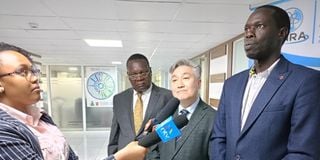Kenya’s nuclear regulator mulls MoU with South Korea

Kenya Nuclear Regulatory Authority Director General James Keter (right), board chairman Omondi Anyanga and South Korean nuclear expert Yunhwa Choi address journalists in Nairobi on November 10, 2023.
What you need to know:
- Other than capacity building and technology transfer, Kenya is keen on strengthening its nuclear regulatory capacity.
- The meeting came hardly a month after Kenya kicked off a special post-graduate training on nuclear and radiation safety.
With Kenya planning to have its first nuclear power plant in 2037, the government is seeking South Korea’s financial and technical support.
Other than capacity building and technology transfer, Kenya is keen on strengthening its nuclear regulatory capacity.
On Friday, Kenya Nuclear Regulatory Authority (KNRA) officials held talks with South Korea nuclear experts with a view to hammering out a cooperation agreement.
The meeting discussed, among other areas, regulatory aspects that need to be addressed and how the country could benefit from South Korea’s experience.
KNRA chairman Omondi Anyanga and Director General James Keter said Kenya’s successful nuclear power debut will largely depend on funds, adequate regulatory controls and development of manpower.
“Korea has supported Kenya in many ways. We look forward to productive engagements in many respects. There’s a lot to learn from South Korea’s journey with nuclear,” Mr Keter told the media at the end of the meeting.
Regulatory infrastructure
The Director General said South Korean institutions had in the past trained many nuclear experts from Kenya and other African countries.
Mr Anyanga said KNRA will work close with international partners, research agencies, academic and the Nuclear Power and Energy Agency to prepare adequately for what he termed Kenya’s nuclear take-off.
The visiting delegation comprised Yunhwa Choi, the Programme Manager of Korea’s Nuclear Nonproliferation Education and Research Center (KAIST), Prof Sung Yim KAIST Vice President, Dr Bum-Jin Chung of Kyung Hee University, who is also the President of the Korea Nuclear Society, and Dr In-Cheol Lim, Vice President of the Korea Atomic Energy Research Institute.
The KNRA team at the talks included Director for Licensing Shadrack, Director for Compliance John Opar, Nuclear Safety Director George Njoroge, Deputy Director Michael Atogo and Isaac Mundia, and Principal Nuclear Inspector Eric Ngotho.
Dr Bum-Jin, who has previously made a substantial input towards Rwanda’s nuclear pursuits, said part of their interest was to understand the level Kenya had reached in building its regulatory infrastructure.
“Protection of the public and the environment is key in any nuclear undertaking,” he said while citing the experiences from different countries.
Nuclear and radiation safety
Mr Kiti said consultations were ongoing with a view to have Kenya assent to relevant treaties such as the convention on nuclear safety, the convention of early notification of nuclear accident, the convention on assistance in the case of nuclear accident and radiological emergency and joint convention on safety of spent fuel management and the safety of radioactive waste management of 1997.
“In our regulatory development journey, KNRA is seeking financial support on viable financing options towards regulation development since such a process is capital intensive. We are seeking a memorandum of understanding with KAIST, Hyung University and the Korean Nuclear Society for training purposes,” Kiti said.
Experts say there are concerns about the continent’s readiness to harness nuclear and get it right.
The meeting came hardly a month after Kenya kicked off a special post-graduate training on nuclear and radiation safety.
The post-graduate course for Africa’s English-speaking countries is being overseen by the International Atomic Energy Agency (IAEA) and the Kenya Nuclear Regulatory Authority in conjunction with local universities and hospitals.





